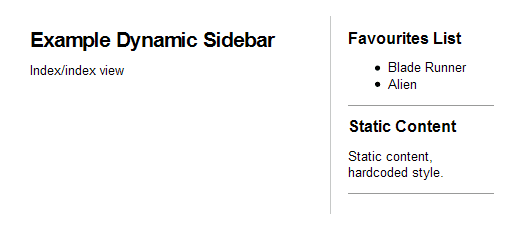The outline of this method is:
- Declare an array of classes to run, each class represents a boxed module on the page.
- Each module's data is collected as an associative array and sent to the view.
- In the layout, loop through this data and then call each partial passing along the data set when there is one.
Here is a picture of the outcome:

Below is an example of 3 sidebar items to be loaded.
$s = new App_Sidebar_Loader();
$this->view->sidebar = $s->load(array(
array('SomeAlert', 'hideEmpty'=> true),
array('FavsList'),
array('StaticContent', 'viewOnly'=>'true'),
));
File locations:
Library / App / Sidebar / Loader.php
Library / App / Sidebar / Modules / SomeAlert.php
Library / App / Sidebar / Modules / FavsList.php
Library / App / Sidebar / Modules / StaticContent.php
Partials (Zend framework view helper):
View / script / Sidebar / SomeAlert.phtml
View / script / Sidebar / FavsList.phtml
View / script / Sidebar / StaticContent.phtml
I didn't want to pre-process the view file names, like from "SomeAlert" to "some-alert.phtml", so I'll just stick to the camel casing for the partial file names.
The Loader class currently supports 2 types of options:
- "viewOnly": Load the view only, no class to execute.
- "hideEmpty": Show module or not when there is no data for it.
/**
* @author 2010 Edward Hew
* @license http://creativecommons.org/licenses/MIT/ Creative Commons MIT License
*
* Options accepted are:
* - viewOnly: boolean, when true grab only view script, no class to exec
* - hideEmpty: boolean, default false, don't show sidebar module id 'data' is empty
*/
class App_Sidebar_Loader
{
public function load($loadList){
$len = count($loadList);
for($i = 0; $i < $len; ++$i){
$sidebarHandle = $loadList[$i][0];
// viewOnly check
if(empty($loadList[$i]['viewOnly'])) {
$class = 'App_Sidebar_Modules_'.$sidebarHandle;
$c = new $class;
$runData = $c->run();
if (sizeof($runData) > 0)
$data[$sidebarHandle]['data'] = $runData;
else if (empty($loadList[$i]['hideEmpty'])) {
$data[$sidebarHandle]['data'] = null;
}
} else {
$data[$sidebarHandle]['data'] = null;
}
}
return $data;
}
}
A module class looks like this:
class App_Sidebar_Modules_FavsList
{
public function run() {
// Call model normally, but I'll just show a sample resulting array
$fav[] = array( 'id'=>1 , 'name'=> 'Blade Runner' );
$fav[] = array( 'id'=>2 , 'name'=> 'Alien' );
return $fav;
}
}
For this module, the return value is an empty array on purpose
/*
* To test loader option hideEmpty
*/
class App_Sidebar_Modules_SomeAlert
{
public function run() {
return array();
}
}
Finally the view helper partial template is called in the layout like this:
Location: layout / script / layout.phtml
if($this->sidebar) {
foreach($this->sidebar as $key => $data){
echo $this->partial( ('sidebar/'.$key.'.phtml'), $data);
}
}
That's all of it, uploaded a working ZF project to Github here (apologies, its in the Branches link on that page). If you have any comments or criticism, please drop a comment. And thanks for visiting!
1 comment:
Works like a charm Edward, ;-)
Post a Comment